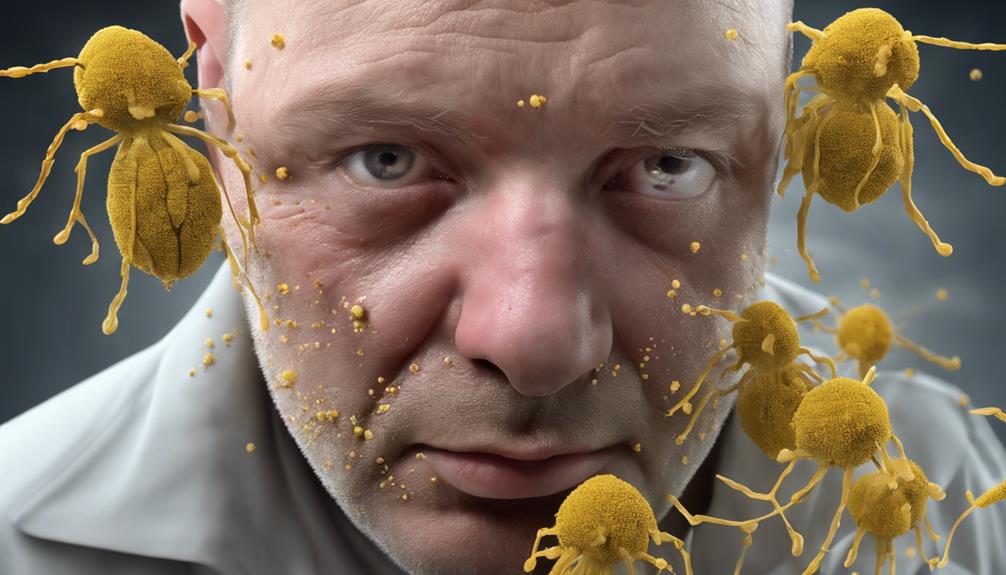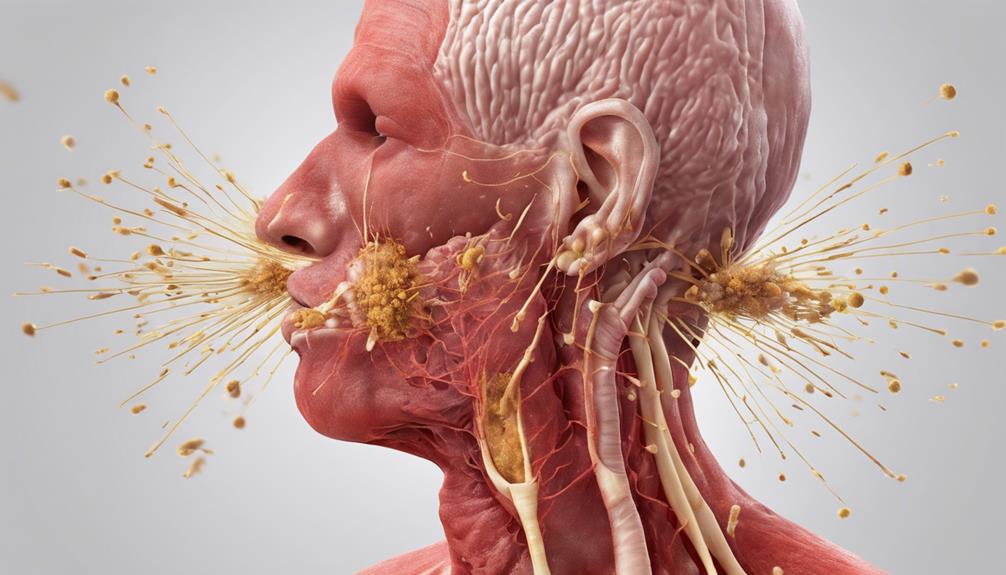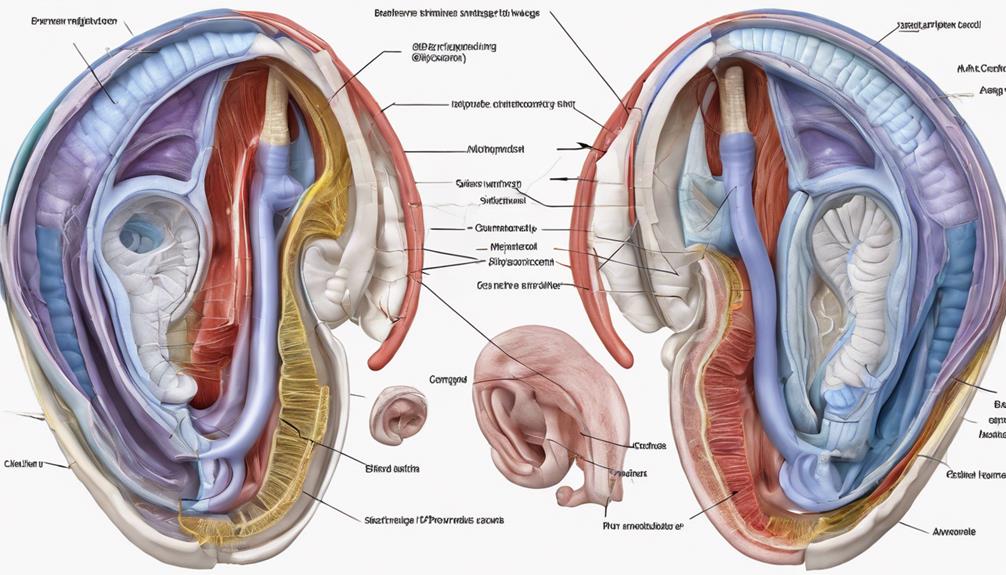Imagine a perfectly synchronized orchestra where each instrument blends seamlessly, only to be disrupted by a sudden and unpleasant noise that throws off the symphony. Allergies, often underestimated in their impact, can serve as this disruptive element in maintaining our overall auditory well-being.
As we explore the intricate connection between allergies and the potential for hearing loss, we uncover a web of complexities that deserve attention. Understanding how allergies can affect our ability to hear is not only enlightening but also crucial in maintaining the delicate balance of our auditory world.
Key Takeaways
- Allergies can lead to inflammation and blockages in the ear canal, affecting hearing function.
- Understanding the connection between allergies and hearing loss is crucial for effective management.
- Excess mucus production from allergies can contribute to conductive hearing loss.
- Seeking professional help early ensures tailored solutions for allergy-related hearing issues.
Allergies and Hearing Loss Overview
Allergies can significantly impact hearing function by causing inflammation and obstruction within the ear canal. When allergies trigger an immune response in the body, the ear can be particularly vulnerable to the effects. The outer and middle ear are crucial for processing sound waves and transmitting signals to the brain. Allergy-related hearing loss can occur when inflammation or excess fluid buildup interferes with these processes.
In the ear, allergies can lead to symptoms such as itchiness, pressure, and fluid accumulation. This excess mucus can block the Eustachian tube, which connects the middle ear to the back of the nose and helps regulate air pressure. When this tube is blocked, it can affect the movement of sound waves, leading to hearing difficulties. Additionally, allergic rhinitis, like hay fever, can cause inflammation in the ear, further impairing hearing ability. Middle ear infections, often linked to allergic reactions, can also contribute to hearing loss in individuals with allergies.
Types of Allergy-Related Hearing Issues

When considering the impact of allergic reactions on hearing function, it becomes essential to explore the various types of issues that can arise in relation to allergies and their effects on auditory processes.
Excess fluid due to allergies can lead to Conductive hearing loss, where sound waves are obstructed within the ear by fluid or blockages, affecting sound transmission to the cochlea. This may cause discomfort, pressure, and a feeling of fullness in the ear. Tinnitus, a ringing in the ears, can also develop alongside other allergy symptoms, further impacting hearing. Allergy-related Conductive hearing loss may improve naturally over time but should be confirmed through proper testing to ensure accurate diagnosis and appropriate management.
Additionally, allergies can increase the risk of ear infections, especially in individuals prone to seasonal allergies. Understanding how allergies affect the Eustachian tube and the inner ear is crucial in addressing hearing loss due to allergic reactions.
For expert guidance on managing allergy-related hearing issues, consulting professionals at places like Sound Relief Hearing Center can provide valuable insights and solutions.
Connection Between Allergies and Hearing Loss
Exploring the intricate relationship between allergies and hearing loss reveals the profound impact certain allergic reactions can have on the functionality of the ear. When allergies intersect with hearing health, several key mechanisms come into play:
- Immune Response: Allergic reactions trigger the immune system, leading to inflammation in the ear. This response can disrupt the delicate structures responsible for processing sound waves.
- Mucus Production: Increased mucus production due to allergies can cause blockages in the ear canal, resulting in conductive hearing loss. This interference affects the transmission of sound waves to the inner ear.
- Histamine Release: Histamines released during an allergic reaction can contribute to symptoms like ear itchiness, pressure, and even tinnitus. These symptoms can further complicate the hearing process, potentially leading to temporary or permanent hearing loss.
Understanding how allergies impact the ear's function is crucial in managing allergy-related hearing issues effectively. By recognizing these connections, individuals can take proactive steps to preserve their hearing health amidst allergic challenges.
Managing Allergy-Related Hearing Loss

In managing allergy-related hearing loss, treatment options often involve addressing fluid or inflammation in the middle ear through medication. Allergies can cause excess mucus production, leading to blockages in the Eustachian tube and middle ear. When the immune system responds to allergens, it can result in inflammation that affects hearing.
Skin reactions from allergies may also contribute to temporary hearing issues. Tinnitus symptoms, such as ringing or buzzing in the ears, can accompany allergy-related hearing loss. Seeking guidance from a hearing healthcare professional is crucial if allergy-related tinnitus worsens or if hearing loss occurs.
It's essential to explore various treatment options tailored to individual needs, considering factors like medication, allergy management, and potential underlying conditions such as Meniere's disease. Timely intervention and proactive management can help alleviate allergy-related hearing issues, improving overall quality of life.
Seeking Professional Help for Hearing Loss
To address allergy-related hearing loss effectively, seeking professional help from specialists such as audiologists or otolaryngologists is crucial. When experiencing symptoms like ear pain, tinnitus (ringing in the ears), or fluid build-up, it's essential to consult with professionals who can provide expert guidance. Here are three key reasons why seeking professional help is vital in managing allergy-related hearing loss:
- Comprehensive Hearing Evaluation: A thorough hearing evaluation conducted by audiologists or otolaryngologists is necessary to assess the extent and nature of the hearing loss accurately.
- Tailored Treatment Options: Professionals can recommend personalized treatment options such as hearing aids, assistive listening devices, or medical interventions based on individual needs and the severity of the condition.
- Expert Recommendations: Audiologists can offer specialized recommendations for managing and improving hearing loss, drawing from their expertise and experience in the field.
Seeking professional help early on can significantly impact the management and outcomes of allergy-related hearing loss, ensuring a better quality of life for individuals affected by this condition.
Frequently Asked Questions
How Do Allergies Cause Hearing Loss?
Allergies can cause hearing loss by creating excess mucus that obstructs the Eustachian tube, affecting pressure in the ear. This obstruction can lead to inflammation or blockages in the middle ear, resulting in ear infections and reduced hearing ability.
Excess fluid and inflammation from allergies can also impair hearing by affecting sound transmission to the cochlea. It's essential to address allergies promptly to prevent potential hearing issues.
Are Allergies the 6th Leading Cause of Chronic Illness in the Us?
Yes, allergies are indeed the 6th leading cause of chronic illness in the US. Approximately 50 million Americans experience allergies, significantly impacting chronic health issues. Conditions like rhinitis and sinusitis can lead to long-term health challenges.
The economic burden of allergies exceeds billions of dollars annually. Allergies can affect various body systems, underscoring their role in chronic illness.
What Are the 3 Stages of an Allergic Reaction?
When we explore allergic reactions, we uncover a process akin to unlocking a safe. Sensitization marks the initial encounter with an allergen, activating our immune system's sensitivity.
Subsequently, activation signals our defense mechanism to respond to the allergen stimulus. Finally, the effector stage is like a cascade of events, releasing histamine and other chemicals that manifest as allergy symptoms.
Understanding these stages is crucial for effective management and treatment of allergies.
What Happens to Your Ears When You Have Allergies?
When we have allergies, excess mucus production can block the Eustachian tube in the ear. This blockage leads to pressure build-up in the ear, potentially causing hearing loss.
Inflammation or blockages in the middle ear due to allergies can result in ear infections and reduced hearing ability. Allergic rhinitis, like hay fever, can trigger inflammation and excess fluid that impairs hearing.
Middle ear infections can also occur due to allergic reactions, impacting tympanic membrane mobility and hearing.
Conclusion
In conclusion, understanding the intricate relationship between allergies and hearing loss is essential for maintaining ear health. By addressing allergy-related hearing issues promptly, we can prevent potential complications and ensure optimal well-being.
Just like a symphony relies on each instrument playing its part, our ears require proper care and attention to function harmoniously. Let's tune into our bodies, listen to the signs, and take proactive steps towards preserving our precious sense of hearing.










